Crypto Crackdown: Roman Storm Found Guilty in Explosive Tornado Cash Trial

The Tornado Cash trial, centered around co-founder Roman Storm, carried significant implications for developers of noncustodial Bitcoin and crypto technology, as well as privacy-preserving software. Amanda Tuminelli, executive director and chief legal officer for the DeFi Education Fund, closely followed the proceedings, offering insights into the high-stakes nature of the case.
The trial focused on three charges levied against Roman Storm, with a deep dive into the conspiracy to operate an unlicensed money transmitting business charge. Tuminelli, an expert on 18 U.S. Code § 1960 (the federal law prohibiting operating a money transmitting business without a license), argued that Storm had not violated this statute in creating and operating Tornado Cash, an Ethereum-based crypto mixing service. The broader legislative context includes the CLARITY Act and the Blockchain Regulatory Certainty Act (BRCA), both of which contain language designed to protect developers of “non-controlling” (noncustodial) crypto technology, stipulating that they do not require money transmitting licenses and should not be subject to existing money transmission laws.
Tuminelli also highlighted concerns regarding the Department of Justice’s (DoJ) shift away from 2019 FinCEN guidance, viewing it as a threat to innovation within the crypto space. This shift, she contended, could create a scenario where the U.S. government continues to press charges on other developers similar to Storm, despite a memo from U.S. Deputy Attorney General Todd Blanche stating that the DoJ would cease targeting crypto entities, including mixing and tumbling services, for the acts of their end users.
The Tornado Cash trial concluded with a guilty verdict for Roman Storm on the second count of his indictment: conspiracy to operate an unlicensed money transmitting business. This verdict, reached after three and a half days of jury deliberation following a trial that began in mid-July, carries a potential sentence of up to five years in prison. The jury did not reach a unanimous verdict on the other two counts, which included conspiracy to commit money laundering and conspiracy to violate sanctions.
In the aftermath of the verdict, the prosecution motioned to remand Storm into custody, asserting he was a flight risk. However, Judge Failla rejected this motion. The defense, led by Ms. Klein, successfully argued that Storm had little incentive to flee the United States, citing his Washington state home being tied to a $2 million bail bond, his family (daughter and girlfriend in the U.S., parents as green card holders), and the substantial U.S.-based crypto community supporting him. Judge Failla noted the “stability of the verdict is still in play,” likely referring to the likelihood of an appeal, and acknowledged that Storm’s “incentives have shifted tremendously” before denying the prosecution's request.
Shortly after the verdict, U.S. Attorney for the Southern District of New York (SDNY), Jay Clayton, issued a statement. Clayton asserted that “Roman Storm and Tornado Cash provided a service for North Korean hackers and other criminals to move and hide more than $1 billion of dirty money.” He emphasized that while digital assets offer great promise, this cannot excuse criminality, and committed his office to holding accountable those who exploit emerging technologies for crime. Notably, Clayton's statement did not acknowledge Deputy Attorney General Todd Blanche’s memo or the fact that the vast majority of funds moved through Tornado Cash users were not proven to have been obtained illicitly. The DeFi Education Fund, which Tuminelli heads, submitted amicus briefs for both the Tornado Cash and Samourai Wallet cases, though the brief for the former was rejected by the court.
You may also like...
Sports Betting in Africa: Quick Money or Long-Term Addiction?

"Is sports betting in Africa an opportunity for wealth or a trap for addiction? Explore its impact on youth, the role of...
October 2nd: Guinea’s Independence—A Nation With Defiant Beginning and Enduring Story

On October 2, 1958, Guinea made history as the first French colony in Sub-Saharan Africa to boldly declare independence....
The Jumia Story: Lessons From Africa’s First Tech Unicorn

Discover the story of Jumia, Africa’s first tech unicorn, and how platforms like Glovo and Bokku are reshaping e-commerc...
The Silent Cognitive Crisis: Brain Complacency in the Age of AI

“AI offers convenience, but at what cost? Explore how over-reliance on artificial intelligence fuels brain complacency, ...
Legacy Continues: Football Royalty's Son Nets Stunning Screamer for Barcelona Youth

Shane Kluivert, son of Dutch football legend Patrick Kluivert, scored a spectacular 'screamer' for Barcelona's Under-19s...
WNBA Star's Terrifying Health Ordeal: Mitchell Reveals Rhabdomyolysis Left Her Paralyzed

Indiana Fever All-Star guard Kelsey Mitchell revealed she suffered from Rhabdomyolysis during a WNBA semifinal game, cau...
Warner Bros' Box Office Bubble Bursts, But Industry Shrugs: What Does It Mean?

Paul Thomas Anderson's "One Battle After Another" marks a different kind of success for Warner Bros., earning critical a...
DCU's Nightmare: Are Film Franchises Repeating MCU's Fatal Flaws?

The DCU's increasing interconnectivity, particularly in <i>Peacemaker</i> Season 2, is raising concerns about potential ...